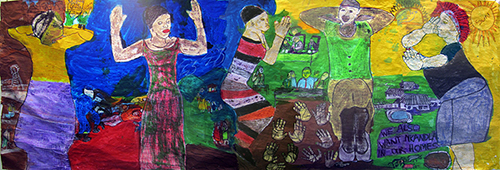Latest News Archive
Please select Category, Year, and then Month to display items
12 January 2024
|
Story Nonsindiswe Qwabe
|
Photo Sonia Small
 Since joining the UFS in 2008, Dr Grey Magaiza has worked extensively on approaches that can foster the socio-economic transformation of societies.
Since joining the UFS in 2008, Dr Grey Magaiza has worked extensively on approaches that can foster the socio-economic transformation of societies.
“The future should be one where communities can decide on their development agenda and futures. That’s the most important for me.” Dr Grey Magaiza, Deputy Director of the Centre for Gender and Africa Studies (CGAS) and Head of the Community Development programme on the Qwaqwa Campus, is passionate about capacitating communities to be agents of change and advancement. His vision for the future emphasises the empowerment of communities to take charge of their development by actively participating in decision making and the implementation of development projects that can improve their lives.
Since joining the UFS in 2008, Dr Magaiza has worked extensively on approaches that can foster the socio-economic transformation of societies. Over the years, he has crafted his research speciality into one that he is most proud of – being an interdisciplinary scientist immersed in the development of communities.
“I’m in a fortunate position of researching what I like. I say ‘fortunate’, because I’ve taken the time to understand what I’m passionate about, which is the overall field of rural livelihoods and livelihood futures – in short, community development. My research starts from an engaged university, understanding the elements that a university must use to enhance transformation and relevance to its immediate community in terms of development.”
One of the ways he has done this is by looking at social entrepreneurship as a development approach for young people in a rural setting. Through workshops with non-profit and civic organisations in Qwaqwa, Dr Magaiza has been helping these organisations to map out their needs and actively meet them through the involvement and support of external role players.
“We understand that communities are part of the national development agenda, but even that national agenda respects community knowledge and intentions and allows communities to shape their identity. A critical enabler of this is community organising. You bring back the capacity in communities to have dialogues on issues affecting them as spaces for engagement, knowledge exchange, and for people to just talk about their way forward.”
By enabling communities to define their development agenda, they can address their specific needs, challenges, and aspirations, he said. “When I look at livelihood futures, it’s quite an exciting aspect of my work – it’s like looking into a fortune tellers’ globe, because you’re not deciding for communities what they should do, but the communities themselves take those decisions.”
Panel to discuss: 'Speaking wounds: voices of Marikana widows through art and narrative' on Monday 27 July 2015
2015-07-24
The massacre of 34 mine workers at Marikana on 16 August 2012 had South Africans in uproar. But what remained, after the razor wire was rolled up and the camera crews left, were 34 widows engulfed in silent despair. That was until the Khulumani Support Group introduced them to the transformative power of art and storytelling. In the last installment of the Vice-Chancellor’s Lecture Series for this year, a panel of speakers will discuss these widows’ journey with the theme of ‘Speaking wounds: voices of Marikana widows through art and narrative’.
Panel
The panel will consist of members from the Khulumani Support Group that include Dr Marjorie Jobson (National Director), Nomarussia Bonase (National Organiser), and Judy Seidman (Sociologist and Graphic Artist). Nomfundo Walaza, who is the former CEO of the Desmond Tutu Peace Centre, will be the respondent.
Details of the event:
Date: Monday 27 July 2015
Time: 12:00
Venue: Chancellor's Room, Centenary Complex, Bloemfontein Campus
RSVP: Nomusa Mthethwa at Nomusam@ufs.ac.za (Members of the public are welcome to attend.)
Body maps
An art exhibition consisting of body maps created by the widows will also be on display. These paintings quietly portray the turmoil of their inner landscapes, their perceptions of the massacre, and the impact these events had on their lives.

Collaboration
The lecture series is hosted by Prof Pumla Gobodo-Madikizela, Senior Research Professor in Trauma, Forgiveness, and Reconciliation Studies at the University of the Free State (UFS), as part of a five-year research project funded by the Andrew W. Mellon Foundation. This installment of the lecture series is presented in collaboration with the UFS Institute for Reconciliation and Social Justice.